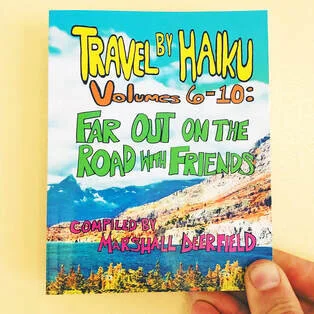April 21, 2021
Travel by Haiku Volumes 6-10: Far Out on the Road with Friends
A Freedom Books
$10.00
You can purchase a copy here.
Reviewed by Brooke Palma
“There was nowhere to go but everywhere, so just keep on rolling under the stars.”
– Jack Kerouac, On the Road
Travel by Haiku Volumes 6-10: Far Out on the Road with Friends continues Marshall Deerfield’s (aka Marshall James Kavanaugh) poetic journey with friends across the Western half of the U.S. The collection uses haiku as a means of describing not only the road trips themselves, but the metaphysical experience of interacting with nature and the new friends we meet on the road in an attempt to transcend the self.
The poems in this collection use the haiku form to great effect. They employ the form’s brief structure to offer wry observations on nature, philosophy, and human connection. Indeed, the idea of human connection actually informed the creative process that formed the poems. Throughout the three trips that make up the collection, Deerfield and his traveling partners employed a unique collaborative process where one person would contribute a line to start the haiku and the others would provide the second and third lines, lending the poems a shared viewpoint that honors the friendship of the writers traveling together.
Inspired by other traveling writers like Basho and Kerouac, this collection shines with moments of real beauty. The beauty described is almost exclusively tied to nature, and that’s where these poems excel. What surprised me the most was the way the real and surreal are interwoven throughout the collection of haiku. The poems focus on concrete moments of the travelers’ experience in nature that transports the reader to places where “the high basin drains/at sunset light floods purple/overflowing with bats.” The poems use plain language and a conversational tone to share the awe-inspiring natural magnificence of the American West. When describing the ephemeral nature of a “pastel pink” Western sunset, the writers are struck by the sunset’s passing, while noticing that “the beauts remain.” The writers use the haiku form’s short lines to infuse their poems with wry observations told with a great sense of humor. Upon encountering a lone aspen tree, Deerfield and company happily describe it as “one tough cowboy!”.
While attempting to describe nature’s profound beauty, the writers are quick to note that the power of words is sometimes inadequate. Poems, such as this one, acknowledge the ineffability of such stunning beauty and power: “Night eclipses thought/overwhelmed by the moon’s rays/words no longer serve.” The humility in this collection that attempts to honor nature but realizes that mere human words are limited in the face of such magnificence is refreshing and provides further praise to our beautiful natural world.
Make no mistake – this is not a collection that seeks to simply describe the sublimity of nature. The collection is a call to action that documents the negative impact humans have on the earth, namely through climate change. Deerfield and his companions are forced to confront “whole forests depleted” on their way to the Rockies. In the prose introduction to the poems reckoning with the loss of these forests, Deerfield explains that Pine Bark beetles are responsible for the destruction. The beetles are part of the forest ecosystem and formerly lived in harmony with the trees they now demolish, but rising temperatures in the forest allow them to live longer than before, leaving the Ponderosa pine trees ”standing like zombies amidst their dying relatives.” The poignancy of this section stands in sharp contrast to the beautiful descriptions in the rest of the collection and mourns the loss of natural beauty in which we humans are complicit.
Travel by Haiku Volumes 6-10: Far Out on the Road with Friends takes the reader on quite the trip through the American West. We’re invited along for the ride through the friends’ consciousness while they encounter moments of natural beauty and the best of human connection. I am grateful to have joined them and enjoyed the journey while reading these poems. I look forward to our next trip!
Brooke Palma grew up in Philadelphia and currently lives in West Chester, Pennsylvania. Many of her poems focus on the connections between culture and identity and finding beauty in the everyday. Her work has been published in The Mad Poets’ Review, Moonstone Arts, Toho Journal, and E-Verse Radio (online), and work is forthcoming in Unbearables: A Global Anthology. Her chapbook, Conversations Unfinished, was published by Moonstone Press in August 2019. She hosts the Livin’ on Luck Poetry Series at Barnaby’s West Chester.


